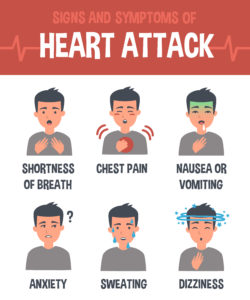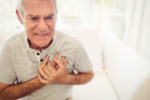 A heart attack is when a blockage occurs in the heart which starves itself of blood and therefore oxygen. Lots of people think that a sudden cardiac arrest and a heart attack are the same. However, a sudden cardiac arrest is when the heart stops beating. A heart attack can lead to cardiac arrest, however they are not the same thing. Heart attacks are very serious, as the heart could go into cardiac arrest at any time. There are around 200,000 deaths a year from heart and circulatory disease. Of these, around 90,000 are due to sudden cardiac arrest. There are around about 125,000 people with heart attacks every year in the UK.
A heart attack is when a blockage occurs in the heart which starves itself of blood and therefore oxygen. Lots of people think that a sudden cardiac arrest and a heart attack are the same. However, a sudden cardiac arrest is when the heart stops beating. A heart attack can lead to cardiac arrest, however they are not the same thing. Heart attacks are very serious, as the heart could go into cardiac arrest at any time. There are around 200,000 deaths a year from heart and circulatory disease. Of these, around 90,000 are due to sudden cardiac arrest. There are around about 125,000 people with heart attacks every year in the UK.
Heart Anatomy
Check out our page on the circulatory system, which includes in-depth details about the anatomy of the heart.
Coronary Heart Disease (CHD)
The coronary arteries are a vital part of the heart. Without oxygen, the heart muscles will not be able to contract, meaning no more oxygen will be pumped around the body. However, over time, people can get a build-up of fatty deposits on the inside of the coronary arteries. The fatty deposits are called atheroma and the overall process is called atherosclerosis. Atherosclerosis causes the narrowing of the coronary arteries meaning less oxygen reaches the heart muscles. This can cause angina and in serious cases, a heart attack. The process takes place over a long period of time, and can show no signs and symptoms until a heart attack occurs.
Symptoms of a Heart Attack
There are many symptoms of a heart attack, and these include:
- Discomfort and pressure in the chest
- Pain in the centre of the chest (just below the breastbone)
- Pain in the arms (especially the left arm)
- Discomfort radiating to the back, jaw, throat or the arms
- Indigestion or a choking feeling which may feel like heartburn
- Sweating
- Nausea
- Vomiting
- Dizziness
- Extreme weakness
- Anxiety
- Shortness of breath
- Rapid or irregular pulse
- Fear and an impending sense of doom.
Heart Attack Treatment
A big problem with heart attacks is that the patient will often not accept they are having a heart attack. Therefore they will delay treatment as they cannot believe what is happening to them. They also might just blame it on indigestion or heartburn. Heart attacks do not mean the heart is going to stop, but they can be a warning sign and have to be taken very seriously. Ensure that someone is calling the emergency services.
Treatment is to identify the problem and sit the patient down. Have a look at our Recovery Position page under “Other Positions”, for a bit more information about the Heart Attack Recovery Position. Stay with the patient until the EMS arrives and calm them down. Giving the patient an aspirin tablet to chew can help. This is because it thins the blood. A good way of always having aspirin on you just in case is by purchasing an Aspod. When the emergency services arrive, tell them what treatment you have given and the events that led up to the person having the heart attack.
Aspods are available from our online store on any ProTrainings website or you can click here.
For more information on training courses, visit our “Courses” page which also includes our First Responder and First Person on Scene (FPOS) Courses.


Pingback: Asthma
Pingback: Stable angina is a very common problem in the UK
Pingback: Aspod - the safe way to carry Aspirin - First Aid Wiki
Pingback: Diabetes - First Aid Wiki
Pingback: Heart attack treatment and the use of Aspirin to treat a patient